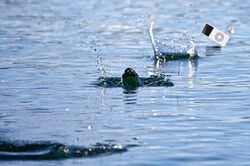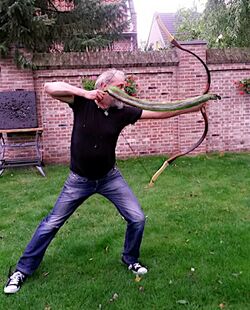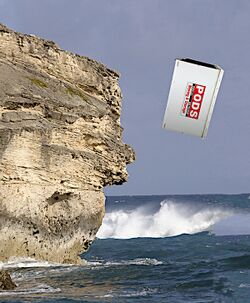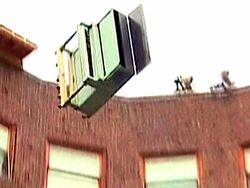Podcasting
Podcasting refers to casting one's iPod into a deep body of water or abyss, such as the sea off the Cornish coast. It is usually done using a fishing rod, but you can use just about anything to podcast. It was the culmination of months or years of useless activity centered around the iPod to cast the device itself.
History[edit]
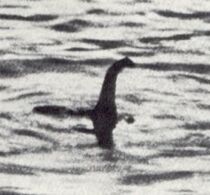
The iPod was released in 2001 in response to the huge excess of time that needed to be wasted. Competing digital music players already existed and were soaking up some of that time in wasted activity, but as always, it took Apple Computer to signal that time-wasting should become a worldwide fad pursued obsessively.
The iPod offered unfeasibly large storage, for the first time making it possible for people to stop listening to music playlists on radio and spend days on end loading playlists into one's own iPod. This would let one have a radio station in the palm of one's hand and own the music — until the iPod or its battery failed, in which you would still be able to recall those years fondly in terms of the satisfying dates you went on...no.
After the craze of owning one's own music faded, the iPod began to be used to own one's own talk radio shows. The iPod owner could collect programs and could listen to only satisfactory opinions and avoid discordant ones. Before long, shows became available that could not garner enough of an audience to justify the purchase of radio time. These programs were "cast" to eager listeners, following the model of pearls among swine.
"Casting" podcasts to iPods, like the mighty oak casting acorns on the ground and hoping some avoid squirrels or asphalt and actually take root, is a subset of the industry of casting ideas to people who do not want them, covered in Advertising.
Gradually, other rituals, such as gathering around the office water-cooler to share opinions on some national telecast, died out, as everyone in the office had his own podcast and no one knew what in Hell any of the co-workers was talking about. After sharing opinions became futile, the 2020 Coronavirus fad took precedence and the office water-cooler, and then the office, died out, regarded as super-spreaders of disease.
Radios and a few offices continued to exist, but catered largely to technophobes, "late adopters," and the already terminally ill. Radio ads were replaced by public-service announcements (PSAs) and "cross-promotions" of other radio programs that were equally uninteresting.
The final stage of this fad was to cast the iPod itself, plus all its contents, into a dark hole or abyss. When this fad caught on, it was pursued competitively as a sport.
Rules[edit]
Getting ready to play[edit]
The equipment you will need is as follows:
- One traffic-control camera.
- Two umpires (one for a water-game).
- Two sets of semaphore flags (abyss-games only).
- Two platforms, one meter in height and diameter.
- Six bales of hay.
- Five iPods per player.
- Chalk (abyss-games only).
- Marker buoys (water-games only).
You will need to set up the equipment as follows:
- The traffic-control camera is place at the waterfront/cliff edge, facing along the waterfront/cliff edge.
- One umpire (the Above Umpire) is placed with the players, at the waterfront/cliff edge, and the second umpire (the Below Umpire) is placed at the bottom of the cliff. One set of semaphore flags is to be given to each umpire, so they may keep in contact for purposes of score-keeping (note: the Above Umpire is the only one needed in a water-game).
- The two platforms are to be placed some distance (any distance that's appropriate) away from the waterfront/cliff edge, and placed ten meters apart with three bales of hay around each platform (these are only used in the event of a tie-break situation).
- The Below Umpire then (using the chalk) marks lines every ten meters from the cliff-edge for two-hundred meters (probably no pod will get that far, but the Below Umpire needs something to do).
How to play[edit]
This is how the game is played:
- Divide all the players into two teams. The teams do not have to be of equal size, but each team must contain at least one quarter of the players.
- Each team is then given 5 pods per player. Lots are drawn and the player with the short-straw goes first. The order then continues alphabetically until all pods have been thrown.
- Points are scored for the following:
- Distance: One point is awarded for every ten meters the pod travels (including bounce-distance). For water games, this can be either measured by marker buoys, or by rule-of-thumb.
- Velocity: Two bonus points are awarded if the initial speed is enough to set off the speed camera (four if the camera was taken from a motorway).
- Damage: On point is awarded for a cracked case, two for a snapped PCB, three for a snapped HDD and five bonus points if all of the above are achieved. If in an abyss-game, the Below Umpire will judge the damage. If in a water-game, points are doubled and judged by the Above Umpire, however the damage must be immediately visible to the Above Umpire before entering the water.
- A player may allow another team-mate to throw a pod for him, however this can only be done once-per-person, and at a cost of 10 points.
- The points-per-team are then divided by the number of players-per-team, then rounded down to the nearest whole number. The team with the greatest number will then win.
- If a tie is reached, then one player is chosen from each team to stand on the platforms, and the two chosen players then take it in turns to throw bales of hay at each other (starting with the player whose name is first alphabetically). If any one player should fall off his platform at any point in this stage, that person, and their team, will then have lost.
- If no player has fallen of their platforms after each has thrown three bales, they will then have the opportunity to play Ching-Chang-Walla (otherwise known as Rock Paper Scissors) until a clear winner emerges.
Variant Games[edit]
With the enormous popularity of the Podcasting sport, it's no surprise that variants have sprung up all over the world.
The first to become well known was probably Seedpodcasting, possibly because seed pods and eye pods look fairly similar (after three or four scotches).
Catalpa Podcasting[edit]
The most popular variant on Seedpodcasting, year after year, has been Catalpa Seedpodcasting. While the attractive flowers which result from farming catalpa pods no doubt has something to do with the popularity of this sport, the ease with which conventional arrow accelerators (pictured, at right) may be adapted for use with catalpa pods surely has had an impact as well.
Podcasting, Heavyweight Division[edit]
In order to qualify as an Olympic sport, the world of podcasting had to accept that there would be categories of 'casting based on the mass of the thrower and the object thrown. Thus, we've seen the Flyweight Division (in which milkweed seed pods figured prominently), the Welterweight Division (in which alien pods, weighing about 10 times what an iPod weighs, were used up until last year, when two of the judges were attacked by face huggers), and now, new this past year, we have Heavyweight Podcasting.
The winning team during the summer Olympics came in nearly 1,000 points ahead of the second place team, in part as a result of scoring extra points by filling their POD with their neighbor's furniture as well as an entire family of pod people who had been living in a POD left on a vacant lot behind the local high school.
Third Generation Casting[edit]
First came iPods, next came catalpa pods, and now, in the latest twist on the craze which has swept the sports world, we have ... Piano casting!
While purists claim that there's no similarity between a "piano" and a "pod", and that the sport of piano casting shouldn't be associated in any way with true podcasting, the "reformed" wing of the podcasting world points out that "pod" and "piano" both begin with the letter "p". End of story, right?
Others[Who?] have also pointed out that an iPod's original purpose was to play music, and the original purpose of most pianos is also to play music, so, really, the connections between pod casting and piano casting could hardly be tighter.
Professional Podcasters[edit]
Those who make their living at this sport are known in the business as "Pod people". We attempted to interview Kkxax (pictured at right) but since everything he(? or she?) said sounded to us like a fourth grader attempting to learn to play the trumpet, we didn't get much usable material from the conversation.
By reputation, Kkxax has swept the welterweight division the last three years, and was reputed to be the most amazing alien pod caster ever seen. The world of sports hasn't heard much from him since the Facehugger incident, which is unfortunate.
